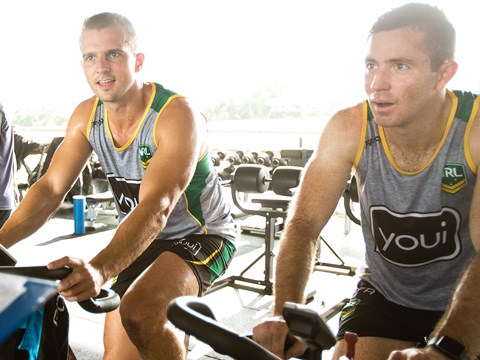
When Grant Atkins started his career as a rugby league referee in the Penrith district 20 years ago, he would usually arrive at a park 15 minutes before kick-off and take it from there.
Now he is one of 19 full-time NRL referees who go through brutal physical and mental tests to ready themselves for the weekly challenges of the hardest code on earth.
For most people, 20 minutes on the treadmill is hard yakka. Amongst referees, that's child's play.
Thursday's training session comprised of four circuits – treadmills, spin bikes, grinders and rowing machines – where two referees would have to complete energy-sapping interval training while at the same time answering questions from strength and conditioning coaches who would bark random numbers or phrases for them to remember.
Brain training under fatigue is one of the most important parts of an official's training, with referees expected to recall key information on the run as they would during an NRL game.
The test isn't solely designed to build mental stamina under fatigue; it also strengthens bonds between referees who train as a pair and then work together in their designated matches.
"We do brain training sessions once a week leading into the weekend's games," Atkins told NRL.com after a rigorous training circuit in oppressive heat at ANZ Stadium.
"I always try to achieve 100 per cent accuracy just like I would on the weekend. There are times when you're pretty dirty on yourself if you miss something. But that's part of the challenge.
"You know you might get one or two questions wrong in some of the activities, and that can lead to a bit of frustration, but one of the things we work on here is moving on from those mistakes and ensuring we get the next decision correct.
"We do these sessions after appointments come out early in the week. We'll be paired with the referee that we're assigned for that weekend's game.
"That's a good way to start the conversation with how you're going to operate together and what is expected of you by your partner. It builds a relationship and more open communication for the upcoming game."
Some of the challenges include interval training on a treadmill that involves maximum capacity running for 30 seconds before being required to make judgements using head-cam vision from pocket referees.
However, Atkins revealed there was one circuit that towered above the rest as the most physically and mentally demanding challenge on the program.
"Physically the rower is the most difficult circuit because a lot of it is recalling verbal information that you're given," he said.
"As you would have noticed, there is a lot of background noise and excess communication that's occurring at other stations and that obviously makes it harder to recall information.
"In an eight-minute set you'll be doing one of two things. One of them is an iPad game which involves paint dropping into three different buckets at different paces. It seems pretty basic, but under fatigue you have to remember at the end of the exercise which bucket had the most paint drop into it.
"Then you'll go back onto the rower for a 30-second effort. During that time, one of our coaches will provide you with some verbal cues which are specific to what we do on the field.
"It might relate to a chaser being offside or a marker not being square, and then probably a minute later when you're back on the rower, you're asked to recite what you were told in that order.
"It's important to us because if you look at information that's given to us from the Bunker, it's relayed to us and we're reciting it to the captain. Sometimes under pressure there is disagreement or confusion over the decision, but under pressure we have to be clear and explain why we reached that conclusion."
NRL General Manager Officiating, Tony Archer, said training had changed since he was a referee, but stressed the key principles were still the same.
"We did a little bit of this but certainly over the last few years we've developed it a fair bit," he told NRL.com
"We just want to get them ready for the game. As I said, one of the main things they have to do is make decisions and make them under fatigue.
"We do this system in blocks and we're always looking at improved results from the referees.
"In a game they make approximately 400 critical decisions and they do that at about 85 per cent of their maximum heart rate. They run somewhere between eight and 10 kilometres every game.
"They understand the importance of this. They have to get as close to game conditions both mentally and physically as possible. This is a really good way for us to sharpen our mental toughness and decision making."